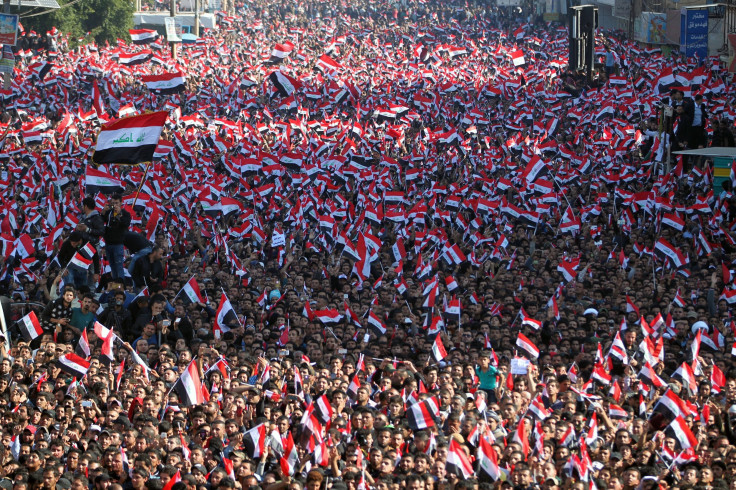Iraqis Gather In Baghdad For Massive Anti-Corruption Rally Led By Shiite Cleric Muqtada Al-Sadr

Several people took to the streets in Baghdad, Iraq, on Friday to protest against corruption and the government’s plans to backtrack reforms, Kurdish news agency Rudaw reported. The protest is being led by Shiite cleric Muqtada al-Sadr, who gathered demonstrators at Tahrir Square in central Baghdad.
Last month, Al-Sadr had given Iraqi Prime Minister Haider al-Abadi a deadline to bring in reforms or face protests from the country’s residents. On Friday, the Shiite cleric addressed the demonstrators and accused the government of being responsible for the ongoing financial crisis faced by the country. He also said, according to Rudaw, that the current government was not a true representative of the country and its people. The report said that about a million people gathered at Tahrir Square for the protest.
“This demonstration is the voice of the displaced people and the oppressed Sunnis,” al-Sadr said, according to Rudaw, adding: “We disown any corrupt party or personality.”
During his warning a month ago, al-Sadr said that the former government led by Nouri al-Maliki was responsible for the fall of Mosul and urged the al-Abadi government to hold them responsible for it. A local politician had also told Rudaw that the protests were aimed at bringing the country back in the right direction. But addressing the protesters, al-Sadr asked them to keep the protest non-partisan.
“Abadi must carry out grassroots reform,” al-Sadr said Friday, according to Rudaw, adding: “Raise your voice and shout so the corrupt get scared of you.”
Iraq is currently facing a crisis after the rise of the Islamic State group, also known as ISIS, as well as an economic crisis, raising concerns about the government's ability to provide basic domestic services, the Associated Press (AP) reported earlier this month.
Al-Sadr, in his demands, has asked the Iraqi government to include the powerful militias formally into the country’s security forces, AP reported. This included al-Sadr’s militia Saraya al-Salam, formed in 2014 when Mosul fell into the hands of ISIS. Al-Sadr also called for a Cabinet reshuffle and threatened to withdraw from the political process if his proposals were not accepted. Al-Sadr’s party currently has 34 seats in the Parliament.
Baghdad's protest today pic.twitter.com/jZwvFJhRDj
— Abdullah Shareef (@abdosha97) February 26, 2016
Supporters of Moqtada Al-Sadr take to the streets following his orders to protest against corruption #Baghdad #Iraq pic.twitter.com/saRkvbC7B0
— Iraq Live Update (@IraqLiveUpdate) February 26, 2016
© Copyright IBTimes 2025. All rights reserved.






















